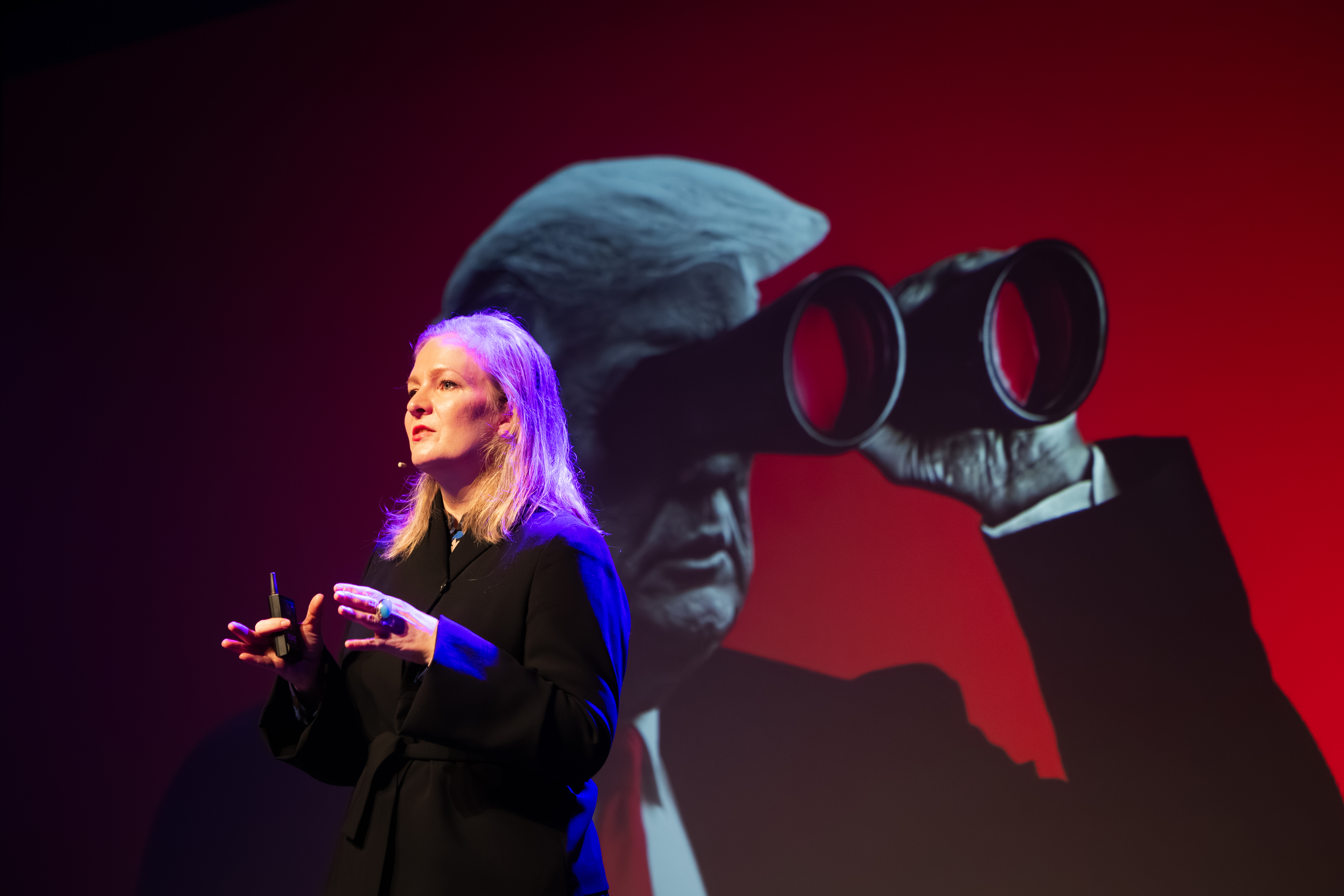Connect 2025: Highlights & Takeaways from a Nordic Perspective
By Natalia Moskaleva on 14 November 2025
10 min read

This year’s Connect at Bremen Teater in Copenhagen was all about the evolution of the digital identity space in Europe—and the bigger questions that now shape its direction.
How should Europe respond to the growing, often indirect influence of big tech? How can verifiable information help rebuild trust in the digital world? And if disasters are becoming part of a new “normal”, what mindset will best prepare us to meet this emerging reality?
The program also offered a closer look at the work of those building the next generation of Europe’s digital trust infrastructure: Germany’s national EUDI wallet, the emerging Europe-wide framework for verifiable information, and a personal consent-sharing app that puts individuals back in control of their data.
It was a day full of insights—and it concluded with one major announcement of our own.
You’ll find the key takeaways and a recap of the talks below.
Key takeaways from Connect 2025
Digital sovereignty is a political imperative
Europe must stop treating its digital systems as mere commercial products and start managing them as critical public infrastructure. This is no longer just a business issue, but a political one that requires coordinated action and investment. Europe has a brief window of opportunity to build its own sovereign tech stack and "move technology closer to home," or it risks losing the chance entirely.
Trust is the foundation for resilience
In an increasingly volatile world, a society's ability to handle shocks—whether a natural disaster or a digital crisis—depends on its underlying social connections and trust. Building a more trustworthy digital environment isn't just a technical upgrade but a part of preparing for the future.
Europe's core values are its strength
A clear contrast was drawn between the secretive operations of the American tech giants and a European approach based on openness and transparency. Europe can learn from other nations, but define its own path rooted in the values that unite its societies.
Wallets and verifiable credentials are the rails on which digital trust is built
The new digital infrastructure Europe is building right now creates a secure layer where data can be verified automatically, with cryptographic trust and privacy protections built in. The source, integrity, and ownership of information can be verified in a standardized and secure manner.
New digital identity models put individuals back in control of their data
A major goal of emerging digital identity frameworks is to empower individuals to hold and manage their own information. Privacy-preserving technologies are making this possible, marking a clear shift from traditional, centralized identity systems.
Below, you can read about each speaker’s talk in detail.
Marietje Schaake: The Tech Coup and how to undo it

Marietje Schaake is a non-resident Fellow at both Stanford’s Cyber Policy Center and the Institute for Human-Centered AI. She opened with a reflection on her book, "The Tech Coup," noting that in the year since its publication, the word "coup" no longer feels like an exaggeration. Her talk offered several lenses to understand how concentrated tech power now rivals that of nation-states, affecting everything from geopolitics to democracy.
Key Takeaways:
- We must see tech giants as geopolitical actors, not just companies. Their market caps are comparable to the GDPs of countries like Germany or France, and they control critical global infrastructure like satellites and undersea cables. To understand possible consequences, just consider Starlink's role in Ukraine, where a single CEO's decisions directly influenced the course of the war.
- This power is often exercised in secret, bypassing democratic oversight. Schaake explained how tech companies "shop around" for favorable jurisdictions to build the infrastructure they need. At the same time, new technologies like 0-click spyware and facial recognition tech are capable of creating new realities of surveillance that infringe on human rights faster than laws can respond.
- Despite these challenges, Schaake's message was ultimately one of opportunity. She stressed that while Europe has great regulations (like GDPR and the AI Act), that is no longer enough. The next step is investment. She emphasized the importance of building Eurostack – a full sovereign European tech ecosystem—to reduce dependency and safeguard democracy before the chance is lost.
Panel: Short- and long-term goals for a safe EU tech stack

Katrine Thielke–Criipto's VP of Marketing and Communication–led a discussion with Marietje Schaake, Mikkel Flyverbom (Professor of Communication and Digital Transformations at Copenhagen Business School), and Andreas Holbak Espersen (Branch Director at Dansk Industri) on the next steps for building a secure and sovereign European tech infrastructure.
Here are the key takeaways from their discussion:
- Digital sovereignty is a political issue. All panelists agreed that while it touches security and business strategy, digital sovereignty is primarily about politics. Leadership is needed to map the problem, define priorities, and guide companies in managing the risks of foreign tech dependency.
- Europe should treat technology as critical infrastructure. The panel argued that digital infrastructure—including AI, cloud systems, and major platforms—should be treated like public infrastructure. Just as we wouldn't accept essential services like electricity being fully controlled by foreign entities without accountability, the same principle should apply to tech.
- Managing existing dependency requires collective action. Europe’s heavy dependence on US technology is a major risk, especially when political unpredictability could weaponize that dependency. Companies, especially SMEs, cannot make this transition alone and coordinated, high-level leadership and guidance are required.
- Europe must act decisively. The continent has a chance to develop local expertise and coordinate solutions at a European level, rather than leaving innovation to individual countries. While there are valuable lessons from the US—such as the collaboration between universities, government, and the military that helped create Silicon Valley—Europe must tailor any approach to its own realities.
Annemette Broch & Kim Nørskov: Data for Good Foundation: A new social contract for use of data

Annemette Broch, founder of the DATA for GOOD Foundation, introduced a personal consent-sharing app that leverages Article 20 of the GDPR (the right to data portability). The app enables users to manage consent, control access, and share data securely for research without exposing the raw data.
Kim Nørskov from Partisia described the technology behind the app: secure multi-party computation keeps data encrypted even while it is being used, and verifiable credential mechanisms ensure data integrity. The focus is on privacy and a trustworthy user experience, where the individual has control over their data.
Niels Flensted-Jensen: Verifiable Information: An EU initiative to increase trust and reduce cost!

Our CEO, Niels Flensted-Jensen, discussed how Europe is building the “rails” for verifiable information — infrastructure that lets data be verified automatically, with cryptographic trust built in and privacy protections in place. This approach makes it possible to confirm the source, integrity, and ownership of information contained in a digital credential, creating a more reliable and privacy-preserving digital environment.
Key Takeaways:
- A new infrastructure for trust is coming: Digital wallets and verifiable credentials create a secure layer where information can be shared and verified. The new wallet-centered approach is very different from the old federated model.
- We’re moving beyond traditional use cases: Verifiable credentials aren’t limited to IDs. Camera makers and Adobe, for example, are exploring credentials for photos and videos, allowing users to verify the origin of the visuals posted online. This is a very optimistic development given how generative AI has changed the digital space in recent years.
- Individuals are in control: From eID and vehicle registration to memberships, verifiable information allows consent-based data sharing. Machines handle verification, ensuring authenticity and integrity, while users remain in control of the data they share.
Daniel Fett: The German wallet and what we expect from it

Dr. Daniel Fett, Product Owner for Germany’s National EUDI Wallet Project, shared how Germany is implementing the EU’s digital wallet initiative with a dual approach: creating a national wallet while also allowing private providers to offer wallets under the same standards.
Daniel emphasized that the wallet itself is just the visible part of a much larger ecosystem. This full infrastructure his team at SPRIN-D is currently building includes three main components:
- The Blueprint: A document defining the architecture and operational model for the German national wallet.
- PID Provider: The entity that converts a citizen’s eID to a digital version on their smartphone.
- Ecosystem Management Portal: Functions as the registrar and orchestrator for the ecosystem, serving as a single point of contact for relying parties and issuers wishing to participate.
Daniel's key message was that Germany isn’t just building an app—it is deliberately constructing a full ecosystem for digital trust, using these principles as its foundation:
- Privacy & Security: No third party can trace user actions. Users always know which relying party they interact with, and complaints go directly to the Data Privacy Authority if too much data is requested. A bug bounty program will be in place ot reinforce security.
- Agility & Adaptability: Private and public partners experiment with wallets, contributing innovations such as new zero-knowledge proof (ZKP) standards. The system is rolled out incrementally, allowing iterative improvement and testing of new features.
- Openness & Transparency: Development is open-source and involves public consultations. A public ecosystem dashboard displays issuers and credential types, allowing anyone to build applications on top of the ecosystem.
- Digital & User-Centric: Onboarding is fully digital with low barriers, enabling developers to test, experiment, and contribute through the Ecosystem Management Portal.
- Scaling & Orchestration: Standardization, partnerships, and central orchestration should allow the ecosystem to scale while maintaining consistent operations.
- Public & Private Collaboration: Cooperation between public institutions and private actors ensures a robust, sustainable ecosystem.
Frederik Krogsdal Jacobsen: An expedition into the wallet ecosystem of the future

Frederik Krogsdal Jacobsen—our own staff engineer working with identity standards—argued that while people focus on a single EU Identity Wallet, the future will actually be composed of many ecosystems.
He defined an ecosystem as any set of issuers, wallets, and verifiers operating under common rules. Because there are many subsets of organizations and many sets of rules, there will be many different ecosystems. Wallets are simply the medium, and organizations can be in multiple ecosystems at once.
Frederik explained the relationships between ecosystem participants using three models from nature.
- Symbiosis: Explicit cooperation where both parties benefit (e.g., a grocery store and a partner gas station accepting the same membership credential).
- Commensalism: One party benefits while the other is unaffected (e.g., a local shop choosing to read a university's student ID credential to offer a discount).
- Parasitism: One party benefits at the other's expense. For example, a bank might read a credential issued by another bank to gain insight (and, for instance, offer a customer a better mortgage loan). This last model shouldn’t be a concern for most organizations since it only poses a significant risk if the credential contains valuable intellectual property.
Frederik’s advice was for organizations to start considering what credentials they can issue and identifying potential partners. He stressed that companies don’t have to wait for the official EU wallet launch to participate. Creating a smaller ecosystem—for instance, just for your own employees—is always an option.
Kristian Cedervall Lauta: Disasters - and what they can teach us about society

The last speaker of the day was Kristian Cedervall Lauta, Prorector for Education at the University of Copenhagen, whose research focuses on disasters, climate, and risks, how these are regulated, and how they affect the law.
He argues that disasters are not exceptions to normal life but rather blueprints that reveal the nature of our society. He warns that our cognitive biases—like expecting tomorrow to always be like yesterday—make us poor at learning from disasters. If we fail to adapt, disasters act as "reverse Robin Hoods," taking from the poor and giving to the rich, making society more unequal and vulnerable.
Key Takeaways
- Disasters are no longer exceptions but a recurring part of our new reality. They expose the societies’ existing strengths, weaknesses, biases, and levels of trust.
- Resilience is organizational, not incidental. The catastrophic difference in outcomes between the 2010 earthquakes in Haiti (devastating) and Chile (much stronger, yet far less deadly) had everything to do with the way communities organize, build, make decisions, and trust each other.
- The best preparation is social connection. Future competitiveness depends on learning and adapting. Kristian advises becoming "metaphorical smokers"—people who build broad social connections—arguing that the best way to prepare for a disaster is to "invite your neighbor for dinner."
- Trust and shared learning matter most. Communities with strong connections do much better than those without.
The big news: Criipto is now Idura!
To close the event, Niels Flensted-Jensen and Katrine Thielke returned to the stage for a major announcement: Criipto is now Idura! You can read the full story and the reasons behind the name change in our official announcement.
We’re looking forward to seeing you next year at Connect 2026!
Not had enough? Dive into the key takeaways from Connect 2024 right here.
Want to learn more?
If you'd like to learn more about Idura or have any questions, feel free to get in touch with us.
If you're interested in digital identity and want to stay updated on the latest news and upcoming events, subscribe to our newsletter by signing up with your email below.
These Related articles

How Norwegian Electricity Providers Can Meet New Customer Consent Rules

Is Idura Right for You? Test for Free to Find Out!

How Norwegian Utility Providers Can Comply With the Authentication Regulation
Sign up for our newsletter
Stay up to date on industry news and insights